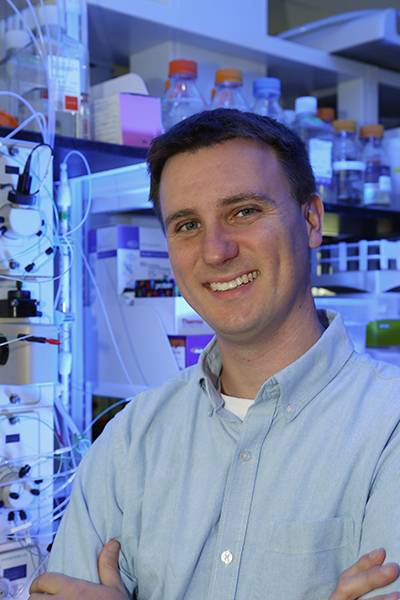Approach developed in part by UNC’s Dr. Steven Gray restored enzyme function and extended survival time in treated mice.

CHAPEL HILL, NC – A new gene therapy approach designed to replace the enzyme that is deficient in patients with Tay-Sachs and Sandhoff diseases, inherited neurodegenerative disorders, successfully delivered the therapeutic gene to the brains of treated mice, restored enzyme function, and extended survival by about 2.5-fold.
The implications of these promising results for developing similar gene therapies for use in humans and for targeting additional brain disorders are reported in two articles published in the journal, Human Gene Therapy.
Steven Gray, PhD from the University of North Carolina School of Medicine, and Jagdeep Walia from Queen’s University in Kingston, Canada, led a team of researchers in the successful development of a specialized adeno-associated virus (AAV) vector. The vector was designed to deliver a gene coding for portions of the alpha and beta subunits of the enzyme that are defective in the Tay-Sachs and Sandhoff mice, respectively. The novel gene transfer vector, administered intravenously, was able to deliver the therapeutic gene to the brain and spinal cord, the targeted sites of action.
“I’m proud of the highly collaborative nature of this work that made it possible, between three institutions across the U.S. and Canada, and in partnership with the New Hope Research Foundation,” said Gray, an assistant professor in the Department of Ophthalmology and a researcher in UNC’s Gene Therapy Center and Carolina Institute for Developmental Disabilities. “Several cutting-edge technologies came together on this, which can now be applied to multiple other rare nervous system diseases. In the meantime, our goal is to develop a human treatment for both Tay-Sachs and Sandhoff diseases based on this work.”
“This important proof-of-concept study sheds important information on the optimal design of rAAV vectors for this class of disorders,” says Human Gene Therapy Editor-in-Chief Terence R. Flotte, MD, Celia and Isaac Haidak Professor of Medical Education and Dean, Provost, and Executive Deputy Chancellor, University of Massachusetts Medical School, Worcester, MA.
The articles are part of a special issue on central nervous system disorders and are available free for download from the Human Gene Therapy website until Aug. 28, 2016.
Links to the articles:
http://online.liebertpub.com/doi/full/10.1089/hum.2016.015
http://online.liebertpub.com/doi/full/10.1089/hum.2016.013
~Press release by Tom Hughes, originally published on the UNC SOM Newsroom website.